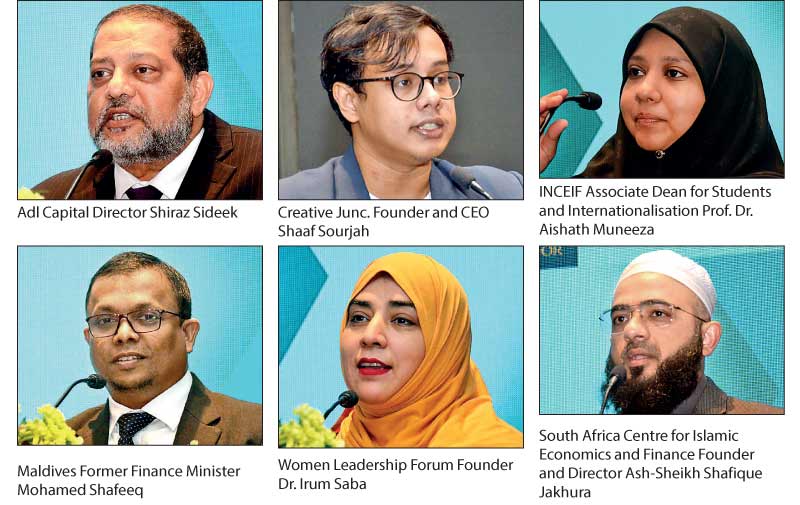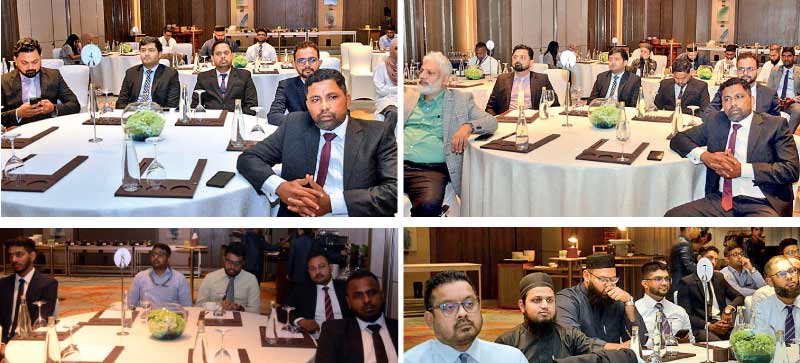Thursday Feb 19, 2026
Thursday Feb 19, 2026
Thursday, 28 November 2024 04:23 - - {{hitsCtrl.values.hits}}

By Janani Kandaramage
The ninth Islamic Finance Forum South Asia (IFFSA) concluded this week in Colombo, with delegates and speakers from across the region, namely Pakistan, Malaysia, Maldives, Bangladesh, and South Africa.
Featuring CEOs of banks, international scholars, insurance companies, and technology firms, the forum aims to strengthen the role of Islamic finance as a catalyst for economic and social progress in South Asia through dialogue on emerging challenges and highlighting new trends, like digital transformation in Islamic banking.
Addressing the forum on the promising developments in Islamic finance across South Asia today, Malaysia INCEIF Associate Dean for Students and Internationalisation Prof. Dr. Aishath Muneeza said: “Sri Lanka is preparing to issue its first corporate Sukuk, a landmark move that signals the country’s openness to Islamic capital markets. In addition, Pakistan recently amended its Constitution, mandating the transition to a Riba-free economy by January 2028, which is a significant milestone for the nation.”
She emphasised that these developments demonstrate that, despite limitations, there is significant progress made in Islamic finance that can be enhanced by taking advantage of opportunities like the IFFSA that utilise networking and discourse between different countries and financial institutions to achieve greater success.
Outlining the strategies she believed could achieve this success, Prof. Muneeza mentioned the need for regional integration and financial inclusion. Establishing cross-border regulatory and market collaborations to share best practices will push for a unified vision of Islamic finance in South Asia, while expanding Shariah-compliant microfinance schemes will empower low-income communities and small businesses. She also called for leveraging fintech and artificial intelligence to enhance efficiency, lower costs, and therefore improve access to Islamic financial services, particularly in rural areas.
Speaking about the global developments in the broader Islamic economy, South Africa Centre for Islamic Economics and Finance Founder and Director Ash-Sheikh Shafique Jakhura said: “Among the UN sustainable goals is the important goal of alleviation of poverty, through equal distribution of wealth. Trying to achieve that in an economy that is based on the principles of interest is like an oxymoron. This cannot be achieved unless fundamental changes in economic systems are made globally. Therefore, we must lead a new economic system founded on the eradication of interest.”
He praised Pakistan’s efforts at supporting Islamic finance through its constitutional amendment while acknowledging that significant progress is yet to be made. Jakhura highlighted that the Islamic economy is not solely limited to banks and other financial institutions but must permeate every economic system.
“Really, a lot of work needs to be done as far as promoting the Islamic economy is concerned. It goes to halal food and even halal tourism. Businesses have to change their mind and start operating across the spectrum if we want to make a difference to humanity at large, because success is not measured by the amount we have amassed for ourselves, rather, success is measured by the impact we have had on the lives of others. Ways in which this can be achieved is via capacity building and adhering to the highest standards of Shariah compliance of governance. Lobbying governments to introduce governance standards for Islamic financial institutions and establishing think tanks to formulate resolutions to improving Islamic financial services will ensure public trust and the eventual expansion of Islamic finance further in the region,” he opined.
Chief Guest Maldives Former Finance Minister Mohamed Shafeeq elaborated on his tenure at the Housing Development Finance Corporation (HDFC) of the Maldives, during which remarkable breakthroughs, such as the setup of the Islamic finance window and the issuance of the first listed Sukuk in the Maldives, were accomplished. Shafeeq expressed his gratitude to being able to contribute to the Maldives Islamic Financial Developmental Roadmap as Cabinet Minister of the current Government, signifying Maldives’s path to becoming an international Islamic finance hub. Its recognition for sustainable promotion of Islamic Financial practices at the 2024 Global Islamic Finance Leadership Awards is a testament to the rapid expansion of the Islamic Finance industry over the last decade.
Speaking about this growing demand for Islamic financial products in the Maldives, Shafeeq claimed: “The HDFC’s portfolio is now 35% Islamic finance, while 65% remains conventional. More than 50% of applications received by the HDFC are now for Islamic finance products. The Non-Performing Assets (NPA) for Islamic finance are impressively low, at less than 2%. These numbers speak volumes about the trust, acceptance, and confidence that the public places in Islamic financial services.”
He acknowledged that the Maldives, like many other countries, faces significant challenges in financing its development needs while managing a growing debt burden. Innovative Islamic finance products, particularly Sukuks, can offer viable alternatives to conventional borrowing and address debt sustainability through mechanisms that align with Shariah principles.
The use of an array of Islamic finance products, in addition to Sukuks, is crucial to promoting responsible borrowing and enhancing socially beneficial projects, he stressed. One such example is the issuance of green Sukuks in Maldives, which are specifically designed to fund environmentally sustainable projects that align with the Maldives’ priorities as a nation vulnerable to climate change.
Women Leadership Forum Founder Dr. Irum Saba reiterated this necessity for a variety of Islamic financial products in addition to the Sukuk, encouraging savings and breaking the cycle of debt that customers endure. She also described the scepticism surrounding Islamic financial practices due to lack of public awareness, hindering many from seeking such services.
Nevertheless, she believes that the Sri Lankan consensus to have the Sukuk launched in the country and similar finance forums in the western world signify its inbuilt value that is steadily being understood and accepted. “Islamic finance assets are $ 4.9 trillion in the world. Over 53 nations have regulated Islamic banking and finance. In the present, 23 countries have their centralised Shariah committees or Shariah board. If you consider the number of Islamic financial institutions, even that is increasing with every passing day. So far, Islamic finance has expanded by 11% in the world, showing that there is an overall upward trend in its growth.”
The first session of the seminar was themed “Country Round up: A Period of Severe Headwinds”. It featured Maldives MCDGI Founder Fathimath Shafeega, Sri Lanka Amana Bank CEO Mohammed Azmeer, Maldives Amana Takaful Deputy Senior Manager – Treasury Risk and Compliance Fazeel Naeem, and Dr. Irum Saba. Prof. Muneeza chaired this discussion.
Dr. Saba elaborated on developments in the IBF industry of Pakistan due to the landmark constitutional amendment, increasing the demand for education and training on Islamic banking. Seven sub committees approved by the State Bank of Pakistan and Finance Minister are in place to ensure a smooth transition to the Islamic system of 2028.
In the case of Maldives, however, Shafeega described that limitations prevail due to the lack of sectorial diversification within the economy. The Maldives is primarily a tourist destination, and a resort is often worth $ 30-40 million, which is excessive to be funded through an Islamic bank, she stressed. However, there has been considerable improvement in the present with 800 guest houses financed by Islamic institutions. Although she acknowledges that there may be significant challenges associated with transforming into a finance hub due to its abundance of scattered islands, she asserts that Islamic finance cannot be niche, especially with a Muslim majority in the region.
Speaking about the path to recovery in the banking sector of Sri Lanka, Azmeer highlighted that Amana Bank experienced a fast-paced financial recovery with its best performance recorded in 2023 as they managed to double their dividends. Describing his outlook for 2025, Azmeer hopes for greater collaboration, a range of financial products that are Shariah compliant, and knowledge sharing that distinguishes Islamic banking from the conventional banking system.
The second session focused on “Collaboration, Cooperation, and Cultivation”, moderated by Sri Lanka KPMG Tax Regulatory and Tax Principal Rifka Ziyard. It featured Prof. Muneeza as one of the panellists, emphasising the need for improved quality as a means of strengthening Islamic finance’s role on the global stage. She argued that demand was never an obstacle to expansion, as there is a vast Muslim population across the world.
LOLC Finance DGM – Alternate Financial Services Shiraz Refei spoke of the array of opportunities Islamic finance would offer to the world, including experience with many countries making headway in Islamic finance. Ethical investments will also be facilitated on a global scale, as Islamic banking systems favour projects that foster community development and economic growth.
The final session moderated by Innovation Quotient CEO Mafaz Ishaq examined the impact of technology on the banking sector in particular. BPC Global Solutions Director – Digital Platforms Imran Vilcassim said that while customer experience and personalisation have faltered due to AI, technological innovations such as these have proven highly effective in fraud management.
Nevertheless, Creative Junc. Founder and CEO Shaaf Sourjah believes in the consistent availability of both online and in-person services to target customers of all age groups. He said that software like ChatGPT can be utilised to challenge one’s perceptions and provide valuable insights when brainstorming digital marketing strategies for banking. “AI will not replace humans, but it can replace humans if they do not adapt,” he said.
Lead Event Partner, Sri Lanka Adl Capital Director Shiraz Sideek spoke of Adl’s persistent presence at conferences since its inception. Establishing AdI’s role as the facilitator of this event, he claimed that they had a prominent part to play in the design of the program based on the requirements of the hour. “One key area of focus that we have always tried to rigorously support is the creation of an association of financial institutions within the region. We have one within Sri Lanka, which is working quite actively, but we need more across the region. Looking forward, as part of our extended role, we are also working towards another first, having the 10th IFFSA in two separate locations.”
He also praised the climate of collaboration at the IFFSA, stating that: “Without all these members today, there is no IFFSA. Therefore, we hope and pray we get even more support in the 10th year celebrations of the forum.”
The 10th IFFSA 2025 will be a milestone event as it marks 50 years since Islamic banking was integrated into the financial mainstream.
Pix by Lasantha Kumara
